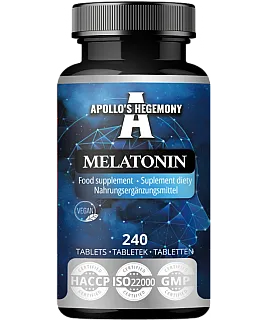Side effects of melatonin use - what should you know?

Melatonin pills are a very popular way to improve sleep quality. However, sleeping aids usually do not have a good reputation in terms of their effect on overall health. How about melatonin? In general, melatonin is considered a very safe substance with a negligible risk of side effects. However, let's take a detailed look at the safety information on melatonin supplements.
Advantages of melatonin
The advantage is its rapid metabolism and breakdown in the body. As a result, even if melatonin from a supplement were to cause any problems, they will quickly subside, as melatonin does not remain in circulation for long.
It is also beneficial that we produce melatonin in the brain naturally, and its additional supplementation from the outside is only to replenish its levels. Our body simply knows this molecule and what to do with it. Thus, there is no such situation as in the case of sleep medications, that synthetic, "foreign" substances to the body force certain actions on various neurotransmitters and receptors, often with above-average force. This can indeed knock you off your feet and effectively put you to sleep, but it also raises certain health risks.
Among the benefits of melatonin (and the sleep it improves) experienced in practice are the ability to:
- falling asleep faster,
- maintaining a healthy, restorative sleep,
- feeling better the next day without drowsiness,
- reduced risk of hypertension and glycemic disorders,
- lowering stress.
The low cost of melatonin supplements is also a very practical advantage. In terms of its safety and efficacy profile, buying melatonin tablets seems like an excellent investment.
What doses of melatonin are safe?
Melatonin taken in doses of 1 to 5 mg can produce peak melatonin concentrations 10 to as much as 100 times higher than physiological values.
Studies show that even very high doses of melatonin (20-100 mg per day) orally administered to healthy volunteers were well tolerated, with no safety concerns and no clinically significant changes in any physiological or biochemical parameters.
Thus we know that even high doses of melatonin are not dangerous, but in fact there is not always a point in such high dosing. In most cases, when sleep problems are not of a pathological dimension, a dose of 1 mg or even less - 300 or 500 mcg - works well. Only when this low dose range proves ineffective is it worth trying to gradually increase the dose and observe the response.
Starting with the minimum possible doses and raising them only when necessary is a very good universal practice for most dietary supplements. Also in the case of melatonin, it is worth following it.
Is melatonin addictive?
Those skeptical of melatonin like to raise the argument that long-term external administration of melatonin can lead to addiction. The brain would be supposed to become lazy, getting the ready-made substance from a pill and stop producing its own completely. This would supposedly make it difficult to wean off melatonin and return to its own production.
The above claims are not supported by scientific data. On the contrary, one can often come across information that even long-term supplementation with melatonin in ordinary doses does not lead to addiction. After the supplementation is discontinued, the brain quite efficiently returns to its own synthesis at an appropriate level, as long as there are no other factors that interfere with melatonin production.
Summary
Side effects with melatonin use are extremely rare. With such a favorable safety profile, its broad health properties become even more attractive. While melatonin is mostly known for its effects on speed of falling asleep and maintaining healthy sleep, its effects on health are far more extensive.
In studies, melatonin supplementation has been shown to be a safe and effective method of improving the speed and quality of falling asleep and the duration of sleep in different groups of people: children, adolescents, the elderly and postmenopausal women.
Sources:
 Next article ⮞
Next article ⮞


